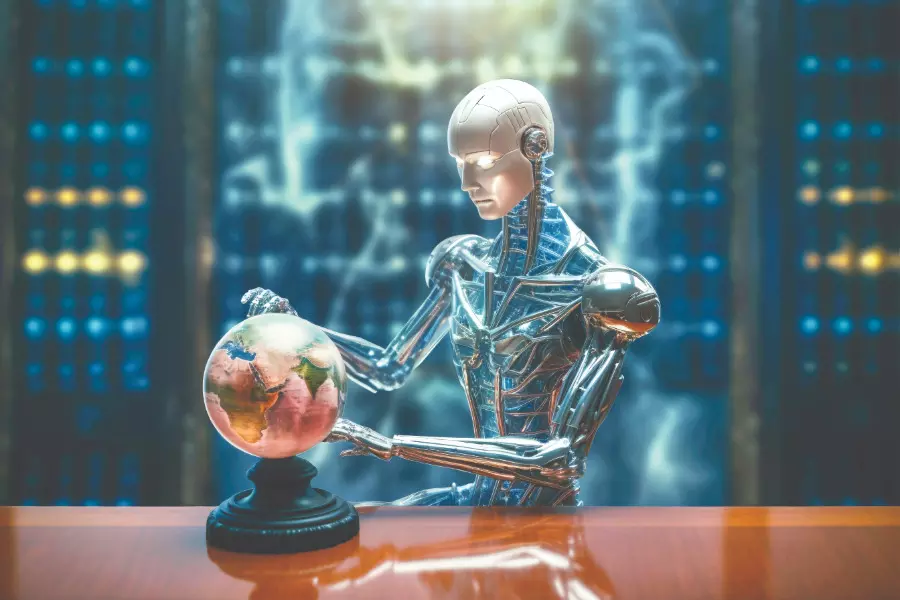OpenAI expansion puts spotlight on India’s global AI role
OpenAI setting up its first-ever office in India could prove to be a turning point for the country’s AI economy

By 2028, India is set to become the world’s third-largest economy, moving ahead of both Japan and Germany. Alongside this economic rise, the country is also making bold strides in the Artificial Intelligence (AI) revolution. India’s domestic AI market alone is expected to more than triple, touching $17 billion by 2027, placing it among the fastest-growing AI hubs in the world. A recent report by Boston Consulting Group highlights how strong the ecosystem already is with over 600,000 AI professionals, 700 million internet users, and more than 2,000 AI startups launched in just the last three years. Amid this momentum, the move by ChatGPT-maker OpenAI to set up its first office in India feels like a milestone moment. India is already the company’s second-largest user base, according to Reuters, and now OpenAI has formally registered as a legal entity in the country and started building a local team. In fact, India is rapidly building a strong AI computing and semiconductor infrastructure to support its growing digital economy. With the approval of the IndiaAI Mission in 2024, the government allocated Rs 10,300 crore over five years to strengthen AI capabilities.
“OpenAI’s decision to establish its first office in India is a milestone for the country, underscoring its growing stature as a global hub for AI talent, innovation, and consumption. With its vast talent pool, thriving startup ecosystem, and one of the largest digital user bases in the world, India has already planted the big seed for becoming the AI capital of the future. This move will inevitably accelerate the demand for specialised AI engineers, data scientists, prompt engineers, ethicists, and UI/UX designers while also making India an even more attractive destination for global investors and innovators,” said Dr Nipun Sharma, CEO, TeamLease Degree Apprenticeship.
India has become a key market for ChatGPT. OpenAI CEO Sam Altman said that watching AI adoption in India has been “amazing,” noting that the country’s ChatGPT user base has grown fourfold in the past year. The timing couldn’t be more crucial. India’s appetite for AI talent is exploding. The demand is expected to hit one million professionals by 2026. By the following year, the sector could generate 2.3 million jobs. But here’s the catch: the talent pipeline may only supply about 1.2 million, leaving a widening gap between what the industry needs and what’s available.
“India’s AI talent gap is real, and bridging this requires a multi-pronged approach. Universities must integrate AI, data science, and ethics as core curriculum, while industry must co-own skilling through apprenticeships, real datasets, and mentorship. Democratizing access to Tier-2 and Tier-3 cities is essential to tap into India’s broad talent base. Specialized training in LLM fine-tuning, MLOps, and AI-driven cybersecurity will accelerate readiness. Equally, building expertise in distributed computing, data pipelines, and multimodal AI systems will be critical for enterprise-scale adoption. Done right, India can move from shortage to surplus, powering the global AI workforce,” said Sanjay Sehgal, Founder, Chairman & CEO, Aziro.
OpenAI has also rolled out a Learning Accelerator programme for India, with the goal of bringing advanced AI tools to the country’s educators and millions of students. As part of the initiative, it has announced a $500,000 grant to IIT Madras, which will help assess OpenAI’s efforts to introduce AI-powered “one-on-one tutors” in classrooms. In another big move on the education front, the company has hired its second full-time employee in India, Raghav Gupta, who until March was heading Coursera’s India operations. Gupta will now spearhead OpenAI’s education projects in the country. Prof (Dr) Tapan Kumar Nayak, Director, Jaipuria School of Business, Ghaziabad, believes continuous skilling, reskilling, up-skilling and apprenticeships are imperative for sustainability of AI landscape in India. “Conventional degrees alone cannot keep pace with rapid technological shifts. Graduates need future-ready skills such as AI/ML, cloud computing, and prompt engineering to deal with the rapid changes in industrial requirements. Apprenticeships will bridge the gap through hands-on, real-world experience that complements academic knowledge and industry requirements. By institutionalizing apprenticeships and internships in AI, analytics, and digital domains, India can ensure a steady supply of skilled and upskilled manpower to challenge the VUCA environment,” he said.
While the rapid rise of AI does pose a threat to certain jobs, it’s also opening up fresh opportunities, especially for those willing to reskill and upskill to stay ahead in a changing workforce. Professionals exhibiting technical expertise with domain knowledge will become prominent in the OpenAI and ChatGPT era, said Seema Shukla, AVP- Strategic HR and Talent Acquisition, ShepHertz. She believes the businesses will fill significant positions with AI researchers, ML experts, and prompt engineers. “The significance of AI optimisation and responsible use of data will also gain traction among the industry verticals. The demand for scientists to refine datasets and extract insights will also pick up pace. AI integration specialists will also chip in by helping technology deployment across industries. Cybersecurity experts will play an important role by thwarting cyberattacks, while demand for AI educators should also surge to support overall literacy of AI. The OpenAI era will not only elevate deep technical roles but also create a new layer of interdisciplinary jobs where technology meets ethics, business, and human behaviour,” she said.



